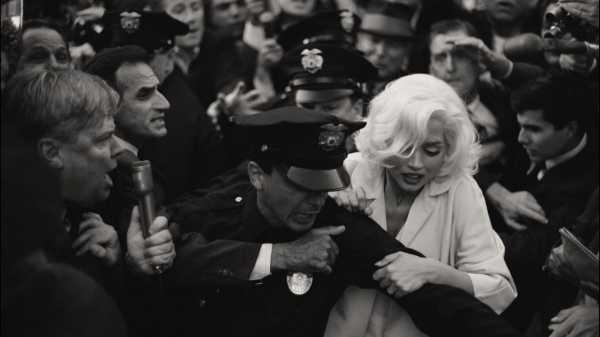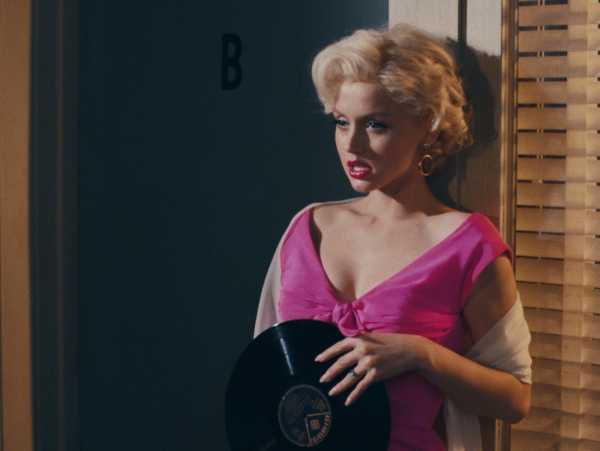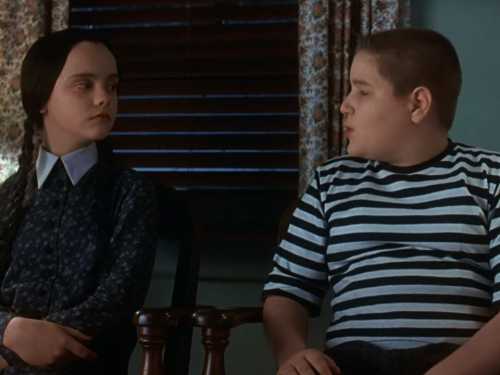
Even if “Blonde,” written and directed by Andrew Dominik, had offered a sympathetic and discerning view of the private life of Marilyn Monroe, it would have been a cinematic disaster. The movie is ridiculously vulgar—the story of Monroe as if it were channelled through Mel Gibson’s “The Passion of the Christ.” The character endures an overwhelming series of relentless torments that, far from arousing fear and pity, reflect a special kind of directorial sadism. In an effort to decry the protagonist’s sufferings, “Blonde” wallows in them. It depicts Monroe as the plaything of her times, her milieu, and her fate, by way of turning her into the filmmaker’s own plaything. The very subject of the film is the deformation of Monroe’s personality and artistry by Hollywood studio executives and artists; in order to tell that story, Dominik replicates it in practice.
“Blonde,” adapted from the eponymous novel by Joyce Carol Oates, has a single idea: that, throughout her life, Monroe was victimized. The child Norma Jeane Mortenson (played by Lily Fisher) is the victim of her father, who never wanted her; of her mother (Julianne Nicholson), who is mentally ill; of neighbors who deliver her to an orphanage. As a young woman, she’s the victim of photographers who take pictures of her in the nude. As Marilyn Monroe (Ana de Armas), she is the victim of a studio boss, Mr. Z (David Warshofsky), who rapes her and then rewards her with roles; of an agent who crafts her persona and forces her to conform to it; of producers and directors who underpay her and stereotype her as sexy and dumb; of her two lovers in a threesome, who use and abuse her confidences. She is the victim of her two husbands during her years of fame: Joe DiMaggio (Bobby Cannavale), who wants her not to work, is fiercely jealous, and is physically abusive; and Arthur Miller (Adrien Brody), who vampirizes her for his work. She is sexually assaulted by President John F. Kennedy (Caspar Phillipson); she is abused by the Secret Service on his behalf. (The movie doesn’t name DiMaggio or Kennedy but identifies them unambiguously by their traits and their roles in Monroe’s life.)
Paparazzi and the press intrude on her private life. Her adoring fans are slobbering perverts who demand her sexiness onscreen and her grateful adoration in public appearances. They mistake her Marilyn Monroe persona for her real self, even though she considers it a pure product for public consumption, having little to do with her real personality. The movie’s emblematic moment shows her looking at a photo of herself—of Marilyn Monroe—in a magazine and saying, “She is pretty, but she isn’t me.” Yet the film never gets close to suggesting who, indeed, the real person is.
The movie presents Marilyn as a thrillingly talented actor who, long before her experience with the Actors Studio, delves deep into personal experience and emotional memory to deliver performances of a shocking intensity. It also indicates that Hollywood offers little outlet for that artistry, and, instead, corners her into roles centered on her sexual allure. It presents her as a well-read, thoughtful, and insightful actor whose artistic ideal and dream remain the theatre, and—in the movie’s best scene—she explains why. During her first date with DiMaggio, she tells him that she wants to leave Hollywood for New York, to study acting, to learn to be a great actress, and to do theatre (above all, Chekhov), because acting in the movies is “cut cut cut.” She adds, “It’s a jigsaw puzzle, but you’re not the one to put the pieces together.” It’s true that acting in movies and onstage are entirely different, and those who are good at one aren’t necessarily well suited to the other. “Blonde” doesn’t display the difference but merely asserts it; the film only winks and nods in the general direction of what Marilyn might have achieved onstage.
Movies may well be “cut cut cut,” and Dominik inflicts some uniquely unkind ones on the character of Marilyn. He omits what ought to have been a prime moment of theatrical bravura, at Marilyn’s first class at the Actors Studio, where she’s put onstage to read the lead role in a play by Miller, who’s there watching skeptically, dubious of the Hollywood diva’s ability to perform the complex role to his satisfaction. Instead, she elicits her classmates’ wild applause and Miller’s stunned admiration and tears of emotion. But that performance itself? Not a second of it is shown.

To tell the story of the deformation of Monroe’s personality and artistry, “Blonde” replicates it in practice.
There isn’t anything about the real-life Monroe’s politics, including her defiance of the press and the studio to marry Miller (who was subpoenaed by the House Un-American Activities Committee to testify about his former links to the Communist Party), her conversion to Judaism, and her own activism (including against nuclear weapons). There isn’t anything about the control that Monroe took over her own career by forming a production company in order to choose and develop her own projects; there isn’t anything about her early enthusiasm for movies or her discovery of modelling. (The movie skips from the child Norma Jeane’s arrival at an orphanage to a rapid montage of the teen-ager’s photos in magazines.) There’s nothing of her effort to escape from poverty and drudgery, her serious and thoughtful efforts to develop her career; not a word about Monroe’s extremely hard work as an actress, or her obsessive dependence, for seven or eight years, on her acting coach Natasha Lytess. In short, whatever has to do with Monroe’s devotion to her art and her attention to her business is relegated to the thinnest of margins.
The movie does insist, by way of a handful of scenes, that the character of Marilyn is an intelligent and insightful actor, yet “Blonde” reduces to an indicative, forensic minimum the scenes in which she expresses sharp ideas and discerning thoughts. For instance, Marilyn says, en route to her catastrophic visit to J.F.K. in a hotel room, that there’s nothing sexual about their relationship. But what went on between them in the encounters before the one in which he attacks her is completely absent. If she had a social life apart from her relationships with men, whether Kennedy, DiMaggio, Miller, or a pair of lovers—Charlie Chaplin, Jr. (Xavier Samuel), and Edward G. Robinson, Jr. (Evan Williams), with whom she’s shown in a threesome—Dominik is uninterested in it.
The problem isn’t just what Dominik doesn’t imagine but what he does. He directs as if he defines poetry as using ten vague words where three clear ones would suffice, and then transfers that misconception to images. In order to approximate a sense of subjectivity, of Marilyn’s states of mind, he relies on images that are out of focus (but not so much that they’re truly obscure), a soundtrack that submerges voices in aquatic murk (but not completely), slow-motion scenes to underline feelings without developing them, a palette that flips back and forth between color and black-and-white (her life sometimes seems to her like a movie—get it?).
But such floppy approximations are trivial alongside Dominik’s more garish and demonstrative tricks. When Marilyn becomes pregnant, it’s through one of the most sophomoric effects I’ve ever seen. She spends an evening outdoors with the two Juniors, talking astrology while looking up at a sky full of stars that begin to move and then morph into squiggling sperm. Her fetus is then shown in the womb, and that fetus returns to the movie repeatedly, in C.G.I. fetus follies that ultimately involve it speaking to her. Marilyn gets an abortion, in order to act in “Gentlemen Prefer Blondes”; this is traumatic, as is a later miscarriage and another, vaguely suggested subsequent abortion. Through all of these episodes, the straining for poignancy and subjectivity is done crudely and callously. A view upward and out, from the point of view of Marilyn’s vagina toward the abortionist, evokes Dominik’s own violation and misuse of the character’s body. Amid such grotesquerie and such vulgarity, de Armas’s performance alone, energetic and nuanced, lends the film a modicum of dignity.
Other such effects and gimmicks throughout the film trivialize its ostensible import and render its grim torment ridiculous. For instance, when Kennedy comes in Marilyn’s mouth, the TV in his room shows a clip of a rocket blasting off and shots (seemingly taken from “Earth vs. the Flying Saucers”) in which alien spacecraft explode against the Washington Monument and the Capitol. Marilyn’s lifelong quest for her father culminates in his face—the face of the man whom her mother called her father—being projected into the sky at the moment of her death. When Marilyn’s songs from her movies are clipped onto the soundtrack, they’re ones that feature the word “daddy,” as from “Ladies of the Chorus,” and “baby,” from “Gentlemen Prefer Blondes.” You’ve got to hand it to Dominik: he doesn’t only outdo the ostensibly crass showmen of classic Hollywood in overt artistic ambition but also in cheap sentiment, brazen tastelessness, and sexual exploitation. ♦
Sourse: newyorker.com






